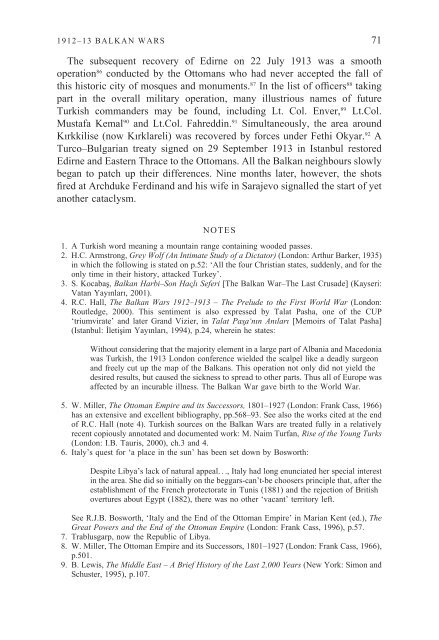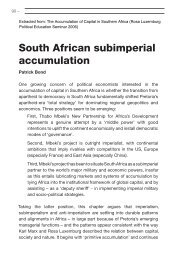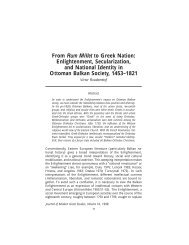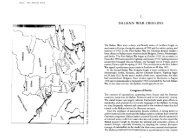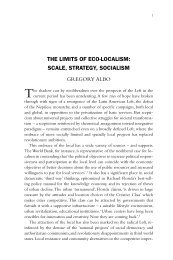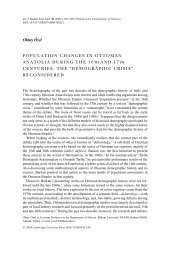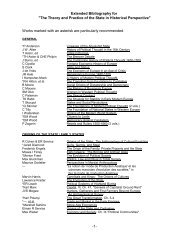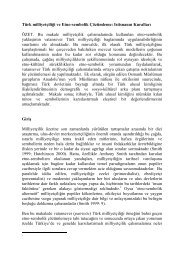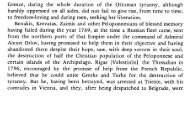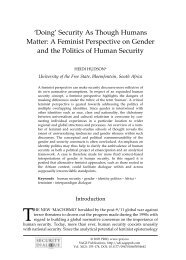Wasti, S. T. "The 1912-13 Balkan Wars and the Siege of Edirne"
Wasti, S. T. "The 1912-13 Balkan Wars and the Siege of Edirne"
Wasti, S. T. "The 1912-13 Balkan Wars and the Siege of Edirne"
Create successful ePaper yourself
Turn your PDF publications into a flip-book with our unique Google optimized e-Paper software.
<strong>1912</strong>–<strong>13</strong> BALKAN WARS 71<strong>The</strong> subsequent recovery <strong>of</strong> Edirne on 22 July 19<strong>13</strong> was a smoothoperation 86 conducted by <strong>the</strong> Ottomans who had never accepted <strong>the</strong> fall <strong>of</strong>this historic city <strong>of</strong> mosques <strong>and</strong> monuments. 87 In <strong>the</strong> list <strong>of</strong> <strong>of</strong>ficers 88 takingpart in <strong>the</strong> overall military operation, many illustrious names <strong>of</strong> futureTurkish comm<strong>and</strong>ers may be found, including Lt. Col. Enver, 89 Lt.Col.Mustafa Kemal 90 <strong>and</strong> Lt.Col. Fahreddin. 91 Simultaneously, <strong>the</strong> area aroundKırkkilise (now Kırklareli) was recovered by forces under Fethi Okyar. 92 ATurco–Bulgarian treaty signed on 29 September 19<strong>13</strong> in Istanbul restoredEdirne <strong>and</strong> Eastern Thrace to <strong>the</strong> Ottomans. All <strong>the</strong> <strong>Balkan</strong> neighbours slowlybegan to patch up <strong>the</strong>ir differences. Nine months later, however, <strong>the</strong> shotsfired at Archduke Ferdin<strong>and</strong> <strong>and</strong> his wife in Sarajevo signalled <strong>the</strong> start <strong>of</strong> yetano<strong>the</strong>r cataclysm.NOTES1. A Turkish word meaning a mountain range containing wooded passes.2. H.C. Armstrong, Grey Wolf (An Intimate Study <strong>of</strong> a Dictator) (London: Arthur Barker, 1935)in which <strong>the</strong> following is stated on p.52: ‘All <strong>the</strong> four Christian states, suddenly, <strong>and</strong> for <strong>the</strong>only time in <strong>the</strong>ir history, attacked Turkey’.3. S. Kocabaş, <strong>Balkan</strong> Harbi–Son Haçlı Seferi [<strong>The</strong> <strong>Balkan</strong> War–<strong>The</strong> Last Crusade] (Kayseri:Vatan Yayınları, 2001).4. R.C. Hall, <strong>The</strong> <strong>Balkan</strong> <strong>Wars</strong> <strong>1912</strong>–19<strong>13</strong> – <strong>The</strong> Prelude to <strong>the</strong> First World War (London:Routledge, 2000). This sentiment is also expressed by Talat Pasha, one <strong>of</strong> <strong>the</strong> CUP‘triumvirate’ <strong>and</strong> later Gr<strong>and</strong> Vizier, in Talat Paşa‘nın Anıları [Memoirs <strong>of</strong> Talat Pasha](Istanbul: İletişim Yayınları, 1994), p.24, wherein he states:Without considering that <strong>the</strong> majority element in a large part <strong>of</strong> Albania <strong>and</strong> Macedoniawas Turkish, <strong>the</strong> 19<strong>13</strong> London conference wielded <strong>the</strong> scalpel like a deadly surgeon<strong>and</strong> freely cut up <strong>the</strong> map <strong>of</strong> <strong>the</strong> <strong>Balkan</strong>s. This operation not only did not yield <strong>the</strong>desired results, but caused <strong>the</strong> sickness to spread to o<strong>the</strong>r parts. Thus all <strong>of</strong> Europe wasaffected by an incurable illness. <strong>The</strong> <strong>Balkan</strong> War gave birth to <strong>the</strong> World War.5. W. Miller, <strong>The</strong> Ottoman Empire <strong>and</strong> its Successors, 1801–1927 (London: Frank Cass, 1966)has an extensive <strong>and</strong> excellent bibliography, pp.568–93. See also <strong>the</strong> works cited at <strong>the</strong> end<strong>of</strong> R.C. Hall (note 4). Turkish sources on <strong>the</strong> <strong>Balkan</strong> <strong>Wars</strong> are treated fully in a relativelyrecent copiously annotated <strong>and</strong> documented work: M. Naim Turfan, Rise <strong>of</strong> <strong>the</strong> Young Turks(London: I.B. Tauris, 2000), ch.3 <strong>and</strong> 4.6. Italy’s quest for ‘a place in <strong>the</strong> sun’ has been set down by Bosworth:Despite Libya’s lack <strong>of</strong> natural appeal. . ., Italy had long enunciated her special interestin <strong>the</strong> area. She did so initially on <strong>the</strong> beggars-can’t-be choosers principle that, after <strong>the</strong>establishment <strong>of</strong> <strong>the</strong> French protectorate in Tunis (1881) <strong>and</strong> <strong>the</strong> rejection <strong>of</strong> Britishovertures about Egypt (1882), <strong>the</strong>re was no o<strong>the</strong>r ‘vacant’ territory left.See R.J.B. Bosworth, ‘Italy <strong>and</strong> <strong>the</strong> End <strong>of</strong> <strong>the</strong> Ottoman Empire’ in Marian Kent (ed.), <strong>The</strong>Great Powers <strong>and</strong> <strong>the</strong> End <strong>of</strong> <strong>the</strong> Ottoman Empire (London: Frank Cass, 1996), p.57.7. Trablusgarp, now <strong>the</strong> Republic <strong>of</strong> Libya.8. W. Miller, <strong>The</strong> Ottoman Empire <strong>and</strong> its Successors, 1801–1927 (London: Frank Cass, 1966),p.501.9. B. Lewis, <strong>The</strong> Middle East – A Brief History <strong>of</strong> <strong>the</strong> Last 2,000 Years (New York: Simon <strong>and</strong>Schuster, 1995), p.107.


